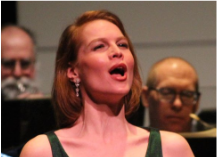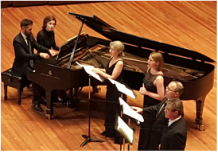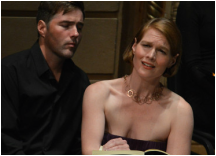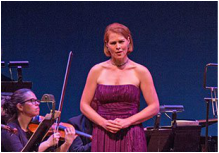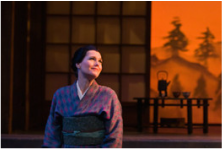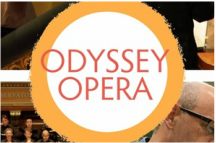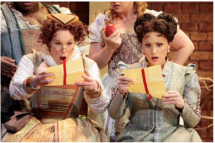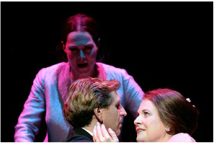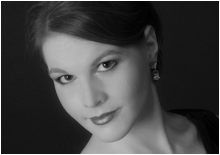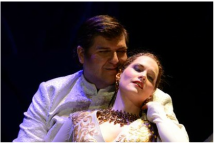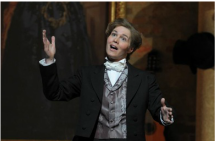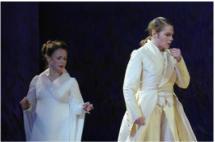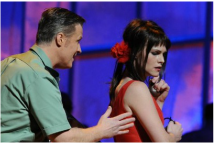Rückert Lieder:
Newport Symphony Orchestra
"Adam Flatt [conductor] has a flair for American musical metaphor, and no metaphor lies closer to the heart than local kid grows up, leaves home and comes back, mercifully unspoiled, as a star.
Erica Brookhyser, the star in question, is impossible not to admire. Erica the woman is impossible not to like.
She can enchant a bunch of Newport kids in a classroom she may well have sat in herself. She can delight dinner guests at the Conductors' Dinner, then she can stand regally beside Adam Flatt and give a piercingly intelligent five-minute pre-concert reflection that went straight to the heart of my favorite composer, Gustav Mahler.
Then there was the voice. The dark chocolaty voice with that tinge of astringency that the melancholic Mahler requires. She effortlessly pierced his densest textures, and surfed the cresting orchestral waves with the thrilling brilliance of her upper register."
-- Brian Hanna, Newport News Times
Newport Symphony Orchestra
"Adam Flatt [conductor] has a flair for American musical metaphor, and no metaphor lies closer to the heart than local kid grows up, leaves home and comes back, mercifully unspoiled, as a star.
Erica Brookhyser, the star in question, is impossible not to admire. Erica the woman is impossible not to like.
She can enchant a bunch of Newport kids in a classroom she may well have sat in herself. She can delight dinner guests at the Conductors' Dinner, then she can stand regally beside Adam Flatt and give a piercingly intelligent five-minute pre-concert reflection that went straight to the heart of my favorite composer, Gustav Mahler.
Then there was the voice. The dark chocolaty voice with that tinge of astringency that the melancholic Mahler requires. She effortlessly pierced his densest textures, and surfed the cresting orchestral waves with the thrilling brilliance of her upper register."
-- Brian Hanna, Newport News Times
Liebeslieder Waltzes:
First Monday at Jordan Hall
"The piece truly belonged to the ladies...Mezzo-soprano Erica Brookhyser cut deep with a devastatingly beautiful “Wohl schön bewandt war es,” her dark crimson tone making even Daumer’s maudlin poetry sound poignant and beautiful."
-- Zoë Madonna, The Boston Musical Intelligencer
First Monday at Jordan Hall
"The piece truly belonged to the ladies...Mezzo-soprano Erica Brookhyser cut deep with a devastatingly beautiful “Wohl schön bewandt war es,” her dark crimson tone making even Daumer’s maudlin poetry sound poignant and beautiful."
-- Zoë Madonna, The Boston Musical Intelligencer
St. John Passion:
Astoria Music Festival
"The mezzo-soprano Erica Brookhyser showed her mettle most significantly in her final aria, “Es ist vollbracht” (“It Is Fulfilled”), a stunning duet with the viola da gamba, played expertly by Adaiha MacAdam-Somer. Brookhyser was a honeyed and mellifluous singer here.
-- Bruce Browne, Oregon Arts Watch
Astoria Music Festival
"The mezzo-soprano Erica Brookhyser showed her mettle most significantly in her final aria, “Es ist vollbracht” (“It Is Fulfilled”), a stunning duet with the viola da gamba, played expertly by Adaiha MacAdam-Somer. Brookhyser was a honeyed and mellifluous singer here.
-- Bruce Browne, Oregon Arts Watch
Phaedra:
Odyssey Opera
"On Saturday, in a dramatically taut and tonally lustrous performance, the mezzo Erica Brookhyser impressively conveyed her character’s contrite wrestling with intractable passions (her love for her stepson Hippolytus), and more broadly, the sense of tragic grandeur that radiates from this brief score."
-- Jeremy Eichler, The Boston Globe
"Erica Brookhyser, who made a strong impression in Odyssey’s Die tote Stadt last September, was nothing short of captivating here as the tragically conflicted wife of Theseus who (alas!) is in love with her stepson, Hippolytus. This short scene lasts only about fifteen minutes, but such is its intensity that it feels like one of the most substantial quarter-hours of opera this side of Brünnhilde’s Immolation Scene. Brookhyser brought a fiercely rich tone and measured vulnerability to the role, which is just what it calls for. In the end, hers was as emotionally searing a performance as they come."
-- Jonathan Blumhofer, The Arts Fuse
"Mezzo soprano Erica Brookhyser proved an exceptionally able singing actress, navigating adeptly among several inner monologues, an address to Hippolytus, and another to Theseus. Though the frenzied address to Hippolytus was the peak of excitement, the most moving passage for me was Phaedra’s final speech to the king. In parallel to her contradictory description of the poison’s action, “chills already dart along my boiling veins and squeeze my heart,” Brookhyser made us see her turmoil as she confessed, yet never lost her nobility."
-- Geoffrey Wieting, The Boston Musical Intelligencer
Odyssey Opera
"On Saturday, in a dramatically taut and tonally lustrous performance, the mezzo Erica Brookhyser impressively conveyed her character’s contrite wrestling with intractable passions (her love for her stepson Hippolytus), and more broadly, the sense of tragic grandeur that radiates from this brief score."
-- Jeremy Eichler, The Boston Globe
"Erica Brookhyser, who made a strong impression in Odyssey’s Die tote Stadt last September, was nothing short of captivating here as the tragically conflicted wife of Theseus who (alas!) is in love with her stepson, Hippolytus. This short scene lasts only about fifteen minutes, but such is its intensity that it feels like one of the most substantial quarter-hours of opera this side of Brünnhilde’s Immolation Scene. Brookhyser brought a fiercely rich tone and measured vulnerability to the role, which is just what it calls for. In the end, hers was as emotionally searing a performance as they come."
-- Jonathan Blumhofer, The Arts Fuse
"Mezzo soprano Erica Brookhyser proved an exceptionally able singing actress, navigating adeptly among several inner monologues, an address to Hippolytus, and another to Theseus. Though the frenzied address to Hippolytus was the peak of excitement, the most moving passage for me was Phaedra’s final speech to the king. In parallel to her contradictory description of the poison’s action, “chills already dart along my boiling veins and squeeze my heart,” Brookhyser made us see her turmoil as she confessed, yet never lost her nobility."
-- Geoffrey Wieting, The Boston Musical Intelligencer
Madama Butterfly:
Opera Colorado
"Some of the most poignant moments are delivered by mezzo-soprano Erica Brookhyser as Butterfly's faithful maid Suzuki. She is glorious in the "flower duet" with Butterfly, and heartbreaking in the latter moments. It is she whose experience of the awful truth about Pinkerton's return determines the audience's reaction to it, and Brookhyser plays it brilliantly."
-- Kelly Dean Hanson, Daily Camera
"Also singing with great emotion is mezzo Erica Brookhyser as the faithful maid Suzuki."
-- Claudia Carbon, Examiner
"Erica Brookhyser’s role as Suzuki is truly a mezzo soprano, and that is Erica Brookhyser. I have attended many operas in my time, and I was startled by the beauty of Erica Brookhyser’s voice." -- Robin McNeil, Opus Colorado
Opera Colorado
"Some of the most poignant moments are delivered by mezzo-soprano Erica Brookhyser as Butterfly's faithful maid Suzuki. She is glorious in the "flower duet" with Butterfly, and heartbreaking in the latter moments. It is she whose experience of the awful truth about Pinkerton's return determines the audience's reaction to it, and Brookhyser plays it brilliantly."
-- Kelly Dean Hanson, Daily Camera
"Also singing with great emotion is mezzo Erica Brookhyser as the faithful maid Suzuki."
-- Claudia Carbon, Examiner
"Erica Brookhyser’s role as Suzuki is truly a mezzo soprano, and that is Erica Brookhyser. I have attended many operas in my time, and I was startled by the beauty of Erica Brookhyser’s voice." -- Robin McNeil, Opus Colorado
Die Tote Stadt:
Odyssey Opera
"Erica Brookhyser had excellence to spare in the smaller role of Brigitta, Paul’s housekeeper."
-- Jeremy Eichler, Boston Globe
"Erica Brookyhyser, as Paul’s faithful old housekeeper, wore housekeeper brown, but this did not disguise the glamour of her smooth, sizable mezzo." -- John Yohalem, Parterre Box
"In the small, but important, role of Brigitta, Erica Brookhyser brought warmth of tone and a sobering presence." -- Jonathan Blumhofer, The Arts Fuse
"Mezzo-soprano Erica Brookhyser sang it feelingly in a clear, bell-toned voice, phrasing naturally yet also dealing easily with sudden leaps in the melody."
-- David Wright, Boston Classical Review
Odyssey Opera
"Erica Brookhyser had excellence to spare in the smaller role of Brigitta, Paul’s housekeeper."
-- Jeremy Eichler, Boston Globe
"Erica Brookyhyser, as Paul’s faithful old housekeeper, wore housekeeper brown, but this did not disguise the glamour of her smooth, sizable mezzo." -- John Yohalem, Parterre Box
"In the small, but important, role of Brigitta, Erica Brookhyser brought warmth of tone and a sobering presence." -- Jonathan Blumhofer, The Arts Fuse
"Mezzo-soprano Erica Brookhyser sang it feelingly in a clear, bell-toned voice, phrasing naturally yet also dealing easily with sudden leaps in the melody."
-- David Wright, Boston Classical Review
El Niño:
Spoleto Festival USA
"Mezzo-soprano Erica Brookhyser was a revelation, a powerful presence with control, depth and extreme dynamic and expressive range." --The Post and Courier, Yiorgos Vassilandonakis
"Bible characters were given voice by excellent soloists--Caitin Lynch, soprano; Erica Brookhyser, mezzo-soprano; and Mark Walters, baritone." --New York Times, James Oestreich
"The soloists were uniformly excellent. Soprano Caitlin Lynch and mezzo Erica Brookhyser both own marvelous instruments, and both covered huge ranges of vocal and emotional expression." --Lindsay Koob, Charleston City Paper
"The six excellent soloists interacted with one another and with the puppets in the most natural way. Mezzo Erica Brookhyser plumbed the darker sides of maternity." --Wall Street Journal, Heidi Waleson
"Caitlin Lynch, Erica Brookhyser and Mark Walters are outstanding as the principal vocal soloists." --Financial Times, George Loomis
Spoleto Festival USA
"Mezzo-soprano Erica Brookhyser was a revelation, a powerful presence with control, depth and extreme dynamic and expressive range." --The Post and Courier, Yiorgos Vassilandonakis
"Bible characters were given voice by excellent soloists--Caitin Lynch, soprano; Erica Brookhyser, mezzo-soprano; and Mark Walters, baritone." --New York Times, James Oestreich
"The soloists were uniformly excellent. Soprano Caitlin Lynch and mezzo Erica Brookhyser both own marvelous instruments, and both covered huge ranges of vocal and emotional expression." --Lindsay Koob, Charleston City Paper
"The six excellent soloists interacted with one another and with the puppets in the most natural way. Mezzo Erica Brookhyser plumbed the darker sides of maternity." --Wall Street Journal, Heidi Waleson
"Caitlin Lynch, Erica Brookhyser and Mark Walters are outstanding as the principal vocal soloists." --Financial Times, George Loomis
Falstaff:
Los Angeles Opera
"The merry wives, who provide the glue that keeps the plot together, were sung by a knowing and exceptionally well-controlled Carmen Giannattasio as Alice Ford and a delightfully goofy Erica Brookhyser as Meg Page." -- Simon Williams, Opera News
Los Angeles Opera
"The merry wives, who provide the glue that keeps the plot together, were sung by a knowing and exceptionally well-controlled Carmen Giannattasio as Alice Ford and a delightfully goofy Erica Brookhyser as Meg Page." -- Simon Williams, Opera News
ristan und Isolde:
Staatstheater Darmstadt
"The singer of the evening was undoubtedly Erica Brookhyser as Brangäne. She used her powerful mezzo with optimal text understandability and her silky voice enthralled the audience with focus and soft shadings. Her stage presence was also flawless." --Manfred Langer, Der Opernfreund
"How remarkable, that in the Darmstadt Ensemble Erica Brookhyser has developed into a glowing, opulent, richly singing Brangäne." --Axel Zibulski, Op-Online.de
"Isolde's confidente Brangäne finds the right tone for this piece. Erica Brookhyser's supple, gently grounded mezzo blends wonderfully with the voice of Nicolay [Isolde]. It was clear that she also reaped a long-lasting ovation at the end." --Thomas Wolff, Darmstädter Echo
Staatstheater Darmstadt
"The singer of the evening was undoubtedly Erica Brookhyser as Brangäne. She used her powerful mezzo with optimal text understandability and her silky voice enthralled the audience with focus and soft shadings. Her stage presence was also flawless." --Manfred Langer, Der Opernfreund
"How remarkable, that in the Darmstadt Ensemble Erica Brookhyser has developed into a glowing, opulent, richly singing Brangäne." --Axel Zibulski, Op-Online.de
"Isolde's confidente Brangäne finds the right tone for this piece. Erica Brookhyser's supple, gently grounded mezzo blends wonderfully with the voice of Nicolay [Isolde]. It was clear that she also reaped a long-lasting ovation at the end." --Thomas Wolff, Darmstädter Echo
Wesendonck-Lieder:
Staatstheater Darmstadt
"At the center of the second half were five songs on texts by Mathilde Wesendonck, a fitting challenge for the opalescent vocal splendor of Erica Brookhyser. The way the soprano begins the first song ("Der Engel") and connects pianissimo tenderness to stunning surges, how she enshrouds the meltingly-beautiful music with a fine black border ("Im Treibhaus", "Schmerzen"), and conjures up a touch of Tristan in "Träume"--the combination of the most beautiful sound and vocal weightlessness makes for a sort of healing musical therapy." --Albrecht Schmidt, Darmstädter Echo
Staatstheater Darmstadt
"At the center of the second half were five songs on texts by Mathilde Wesendonck, a fitting challenge for the opalescent vocal splendor of Erica Brookhyser. The way the soprano begins the first song ("Der Engel") and connects pianissimo tenderness to stunning surges, how she enshrouds the meltingly-beautiful music with a fine black border ("Im Treibhaus", "Schmerzen"), and conjures up a touch of Tristan in "Träume"--the combination of the most beautiful sound and vocal weightlessness makes for a sort of healing musical therapy." --Albrecht Schmidt, Darmstädter Echo
Les Troyens:
Staatstheater Darmstadt
"In the very demanding second part, Erica Brookhyser gave an enthralling theatrical and musical performance of Dido. With a bright-timbred mezzo and powerful gleaming high notes, she colored her role with a variety emotional shadings. Highlights of the evening included the 3rd Act Dido/Anna duet, the 4th Act Dido/Aeneas duet and Dido's final scenes, after which, one left the theater feeling completely fulfilled." ----Manfred Langer, Der Opernfreund
"Erica Brookhyser is once again brilliant. In a superb musical and dramatic interpretation, she embodies Dido's gentleness as well as her revengefulness." ----Thomas Wolff, Darmstädter Echo
"Erica Brookhyser sings marvellously. The duet between the entwined Aeneas and Dido is a glorious antiphonal idyll. And in the final scenes, Smith and Brookhyser ignite a blazing fire of conflicting passions." --Bernhard Uske, Frankfurter Runschau
"In this opera there are two women who make their mark. The wise, cautionary, but ignored Cassandra in Troy and the loving, forsaken and suicide-destined Dido of Carthage. They succeed in starkly differentiating themselves: Katrin Gerstenberger with her fervent despair as Cassandra and Erica Brookhyser with her beguiling lyricism as Dido." --Axel Zibulski, Frankfurter Neue Presse
Staatstheater Darmstadt
"In the very demanding second part, Erica Brookhyser gave an enthralling theatrical and musical performance of Dido. With a bright-timbred mezzo and powerful gleaming high notes, she colored her role with a variety emotional shadings. Highlights of the evening included the 3rd Act Dido/Anna duet, the 4th Act Dido/Aeneas duet and Dido's final scenes, after which, one left the theater feeling completely fulfilled." ----Manfred Langer, Der Opernfreund
"Erica Brookhyser is once again brilliant. In a superb musical and dramatic interpretation, she embodies Dido's gentleness as well as her revengefulness." ----Thomas Wolff, Darmstädter Echo
"Erica Brookhyser sings marvellously. The duet between the entwined Aeneas and Dido is a glorious antiphonal idyll. And in the final scenes, Smith and Brookhyser ignite a blazing fire of conflicting passions." --Bernhard Uske, Frankfurter Runschau
"In this opera there are two women who make their mark. The wise, cautionary, but ignored Cassandra in Troy and the loving, forsaken and suicide-destined Dido of Carthage. They succeed in starkly differentiating themselves: Katrin Gerstenberger with her fervent despair as Cassandra and Erica Brookhyser with her beguiling lyricism as Dido." --Axel Zibulski, Frankfurter Neue Presse
AIDS Benefit Concert:
Staatstheater Darmstadt
"With a warm, dark timbre and sonorous volume in her powerful renditions of Brahms and Schumann, Erica Brookhyser showed herself to be an outstanding art song interpreter. The atmospheric songs of Henri Duparc and César Cui seemed to have been virtually written into the being of this singer. The singer gave shape to the poetry of these works using a rich spectrum of velvety, earthy and fiery tones." --Silvia Adler, Darmstädter Echo
Staatstheater Darmstadt
"With a warm, dark timbre and sonorous volume in her powerful renditions of Brahms and Schumann, Erica Brookhyser showed herself to be an outstanding art song interpreter. The atmospheric songs of Henri Duparc and César Cui seemed to have been virtually written into the being of this singer. The singer gave shape to the poetry of these works using a rich spectrum of velvety, earthy and fiery tones." --Silvia Adler, Darmstädter Echo
Das Lied von der Erde:
Staatstheater Darmstadt Orchestra
"Erica Brookhyser sang with a warm timbre; the ideal type of mezzo-soprano for the part. She could also hold her own formidably well over the instrumental ensemble. -- Elisabeth Risch, Rhein-Main Zeitung
Staatstheater Darmstadt Orchestra
"Erica Brookhyser sang with a warm timbre; the ideal type of mezzo-soprano for the part. She could also hold her own formidably well over the instrumental ensemble. -- Elisabeth Risch, Rhein-Main Zeitung
Tales of Hoffmann:
Staatstheater Darmstadt
"The Muse has a lot to say and sing in this production. And that is fortunate for Erica Brookhyser is the strongest singer of the evening. She enhances her portrayal with a large, pleasing, round voice, clear diction and a natural sense of comedy." -- Johannes Breckner, Darmstädter Echo Zeitung
"Marvelous in both voice and physicality was the Friend-Muse "Niklas" by Erica Brookhyser." -- Bernhard Uske, Frankfurter Rundschau
"The sympathies of the public definitely belonged to Erica Brookhyser, who portrayed an elegant Niklas with boyish, cheeky mezzo, as well as a selfishly loving Muse, who uses all means possible to win over her poet and at the right moment also pulls out her vocal claws."
-- Steffan Meder, Main-Echo Zeitung
"The main character, however, turns out to be surprisingly Niklas (appearing as the Muse in the Prologue and Epilogue), Hoffmann's companion. This is due to this version [...] and on the flexible, natural and expressive singing of Erica Brookhyser. The audience thanked her with the strongest ovation." -- Andreas Bomba, Frankfurter Neue Presse
Staatstheater Darmstadt
"The Muse has a lot to say and sing in this production. And that is fortunate for Erica Brookhyser is the strongest singer of the evening. She enhances her portrayal with a large, pleasing, round voice, clear diction and a natural sense of comedy." -- Johannes Breckner, Darmstädter Echo Zeitung
"Marvelous in both voice and physicality was the Friend-Muse "Niklas" by Erica Brookhyser." -- Bernhard Uske, Frankfurter Rundschau
"The sympathies of the public definitely belonged to Erica Brookhyser, who portrayed an elegant Niklas with boyish, cheeky mezzo, as well as a selfishly loving Muse, who uses all means possible to win over her poet and at the right moment also pulls out her vocal claws."
-- Steffan Meder, Main-Echo Zeitung
"The main character, however, turns out to be surprisingly Niklas (appearing as the Muse in the Prologue and Epilogue), Hoffmann's companion. This is due to this version [...] and on the flexible, natural and expressive singing of Erica Brookhyser. The audience thanked her with the strongest ovation." -- Andreas Bomba, Frankfurter Neue Presse
Orfeo ed Euridice:
Staatstheater Darmstadt
"A huge ovation at the final curtain for Erica Brookhyser: with a keen dramatic sensibility and a full earthy alto she powerfully sang and acted the anguish and happiness of the title hero." --- Thomas Wolff, Darmstädter Echo Zeitung
"In the central role of Orfeo, Erica Brookhyser's mezzo-soprano is capable of taking on almost androgynously dark colors, while still sounding fresh, agile and luminescent." -- Axel Zibulski, Rhein-Mein Allgemeine Zeitung
"Particularly captivating was the freshness and grace of Erica Brookhyser, which she conveys not only through her singing, but also through her dancer's bearing in this role. She endowed Orfeo with memorable gestures, singing with the whole body lying down and in lifts and turns."
--Eva-Maria Magel, Frankfurter Allgemeine Zeitung
"Sung nearly to perfection: The American Erica Brookhyser sings the large role of Orfeo. She captivates with a smooth mezzo, long lines and with her enchanting timbre she achieves a wide variety of expressions for pain and happiness." -- Eckhard Britsch, Opernnetz.de
Staatstheater Darmstadt
"A huge ovation at the final curtain for Erica Brookhyser: with a keen dramatic sensibility and a full earthy alto she powerfully sang and acted the anguish and happiness of the title hero." --- Thomas Wolff, Darmstädter Echo Zeitung
"In the central role of Orfeo, Erica Brookhyser's mezzo-soprano is capable of taking on almost androgynously dark colors, while still sounding fresh, agile and luminescent." -- Axel Zibulski, Rhein-Mein Allgemeine Zeitung
"Particularly captivating was the freshness and grace of Erica Brookhyser, which she conveys not only through her singing, but also through her dancer's bearing in this role. She endowed Orfeo with memorable gestures, singing with the whole body lying down and in lifts and turns."
--Eva-Maria Magel, Frankfurter Allgemeine Zeitung
"Sung nearly to perfection: The American Erica Brookhyser sings the large role of Orfeo. She captivates with a smooth mezzo, long lines and with her enchanting timbre she achieves a wide variety of expressions for pain and happiness." -- Eckhard Britsch, Opernnetz.de
|
Carmen:
Staatstheater Darmstadt "Erica Brookhyser embodies her own version of the title character perfectly: A beautiful woman, but without any done-up affectation, whose warmth can suddenly turn into an all-consuming blaze, and whose sensitivity, the weak spot of her pursuing lover, quickly mutates into a deadly offensive weapon. Combining an extraordinary stage presence and a powerful vocal interpretion, this mezzo-soprano is exemplary." --Benedikt Stegemann, Frankfurter Allgemeine Zeitung "Erica Brookhyser boasts a beautiful voice and a natural instinct for the stage. Her gypsy, around which the entire piece revolves, is a lover, not a demon. Even when she hurls her "Non!" to Don José, the cast-off lover, she remains free of callousness. And when the stalker Don José in the end kills his victim, no one thinks, not even in secret, that it serves her right." --Christian Knatz, Darmstädter Echo, 26. October, 2010 "Erica Brookhyser is a magnificent Carmen. Her mezzo-soprano has a timbre that casts a spell. She dominated the sold out theater, and her dance with castanets added pizzazz. At the curtain call, Brookhyser garnered vociferous Bravos." --Manfred Merz, Gießener Allgemeine "Flawless performance by Erica Brookhyser as Carmen. A female superman, who is thoroughly graceful and savvy on stage." --Bernhard Uske, Frankfurter Rundschau "Erica Brookhyser dramatic approach to Carmen is enjoyable from the depths of her seamless voice to her coquettishness." --Andreas Bomba, Frankfurter Neue Presse |
